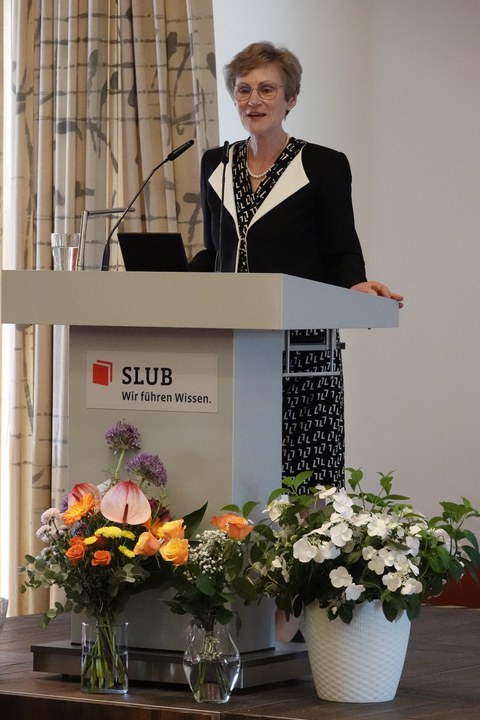Jul 04, 2024
Looking back: Colloquium on the occasion of the retirement of Prof. Dr. Susanne Schötz on 13.06.2024
Prof. Dr. Susanne Schötz, who retired in March 2024, had held the Chair of Social and Economic History since 2006, is a founding member of the GenderConceptGroup and held various positions at TU Dresden. Among other things, she was Dean of the Faculty of Arts, Humanities and Social Science in 2019.
Under the title "Of Trade and Change. Women's lives, cities and markets", a colloquium was held in her honor on 13 June.
A total of over 100 participants first heard words of welcome from the Dean of the Faculty of Arts, Humanities and Social Science (Prof. Dr. D. Schrage), the Managing Director of the Institute of History (Prof. Dr. G. Hürlimann), the GenderConceptGroup (represented by Prof. Dr. M. Häusl) and the Louise-Otto-Peters-Gesellschaft e.V. (Leipzig, represented by PD Dr. A. Franzke). The speakers paid tribute to Susanne Schötz's achievements as a specialist academic and her commitment to academic self-administration.
Four specialist lectures formed the main part of the program. PD Dr. M. Bemmann (Albrecht-Ludwigs-Universität Freiburg) spoke about the economist Otto Hübner, whose "Statistical Table of All Countries" was published in 1851 and has been translated into various languages.
Dr. Gisela Notz (Berlin) dealt with Louise Otto's writing "Das Recht der Frauen auf Erwerb" (1866) and its contemporary impact as well as its significance in the present day.
"Equal rights, but not self-determination" was the title of Dr. Jessica Bock's (Digitales Deutsches Frauenarchiv) lecture, which analyzed the situation of women and the issue of abortion in the GDR.
Steffen Heidrich (Dresden) presented the (re-)constitution processes of small Jewish communities after the Second World War using the examples of Dresden and Würzburg.
All Advisors presented their individual approaches to topics of economic and social history and thus put current research results up for discussion. In doing so, they not only demonstrated the breadth of this historical discipline, but also made reference to Susanne Schötz's work.
Finally, companions (Prof. Dr. W. Müller, Prof. Dr. G. Schwerhoff (both Dresden), Dr. A. Stanislaw-Kemenah (Equal Opportunities Officer of the City of Dresden)) took the floor and paid tribute to Susanne Schötz in a very individual and personal way.
